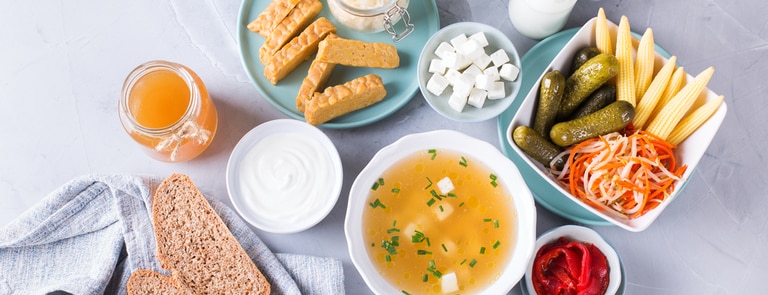15% off £40
Code:QUICK
What are postbiotics? 7 benefits & 11 foods

Heard of prebiotics and probiotics, but not postbiotics? Find out their purpose, their health benefits and how to get them in your diet, in our guide. Learn more.
You’ve probably heard of probiotics, but what are postbiotics?
Picking up momentum in the world of gut health, both prebiotics and postbiotics have been shown to provide a range of different health benefits. Interested in finding out what they are?
Learn all about the benefits of postbiotics and a selection of different food sources in our article below.
What are postbiotics?
First things first, let’s define what postbiotics actually are.
While probiotics are gut-friendly bacteria, postbiotics are bioactive compounds created by probiotic bacteria when they have consumed fibre or prebiotics.1
Our expert nutritionist Alex Glover also adds that:
“Postbiotics are compounds produced as the end product of our good bacteria fermenting prebiotic fibres. Compounds such as lactic acid, butyrate and other short chain fatty acids help to maintain intestinal pH, mucosa and are being researched for a variety of other beneficial physiological functions.”
What is the difference between pre and postbiotics?
The key difference between pre and postbiotics is their role in gut health – and the order they come in.
Prebiotics essentially act as ‘food’ for probiotics, whereas postbiotics are basically a sort of waste product of this process – but that doesn’t mean they don’t have their benefits.
What are postbiotics in skincare?
As well as supporting gut health, postbiotics can also be used to benefit our skin.
These postbiotic skincare products contain the ‘byproduct’ of pre and probiotics – but they’re not necessarily a new thing in the skincare industry.
For example, some of the most popular postbiotic skincare products are lactic acid and glycerol.2
7 benefits of postbiotics
So how can postbiotics be beneficial for our health?
We’ve listed 7 key advantages of postbiotics that are backed up by science, below.
The first benefit of postbiotics that we’re kicking off with is their impact on blood sugar.
Specifically, studies have shown that intestines lacking in microbe balance can be a contributing factor for obesity.
However, muramyl dipeptide (a postbiotic bacterial component) is said to relieve glucose intolerance through increasing insulin sensitivity.3
This therefore suggests that postbiotics could help to reduce the risk of obesity.
Another way that postbiotics can be beneficial is by supporting the immune system.
They have several properties that can help, such as butyrate, which has the capability to stimulate T cell production in the intestine that are used to control the extent of the immune system response.4
Not only this, but postbiotics like cell wall fragments and supernatant help to up the production of cytokines, which are anti-inflammatory chemical messengers that lower levels of inflammation and encourage immune responses.5
This effect has been highlighted in a study from 2010 using 80 healthy adult participants, where they were supplemented with a form of postbiotics every day.
The results of this study showed a decreased risk of respiratory infection, doubled with a better ability to create antibodies which help to fight harmful toxins and bacteria.6
Since pre, pro and postbiotics are all related, it’s no surprise that they support one another.
In particular, probiotics and postbiotics have been shown to work together to exhibit benefits, as the aftermath of the two often cause immunomodulatory responses.7
Handpicked content: What are probiotics?
Another digestive issue that postbiotics may be able to prevent and treat is diarrhoea.
A 2020 review on using postbiotics for preventing and treating common infectious diseases in children found that using postbiotic supplements shortened the amount of time they had diarrhoea.
It was more effective than the placebo at preventing it, as well as preventing pharyngitis and laryngitis.8
Since both probiotics and postbiotics work to fill the gut with an ecosystem that promotes the growth of ‘good’ bacteria, it lessens the production of more harmful, infectious types.
This creates an antimicrobial effect, as the combination of this and how postbiotics directly fight harmful bacteria all works to defend the body against infection.9
Another benefit of postbiotics is their potential to help with allergies like eczema.
One particular study found that taking a postbiotic supplement for between 8 to 12 weeks notably lessened the severity of the symptoms – whereas the placebo group didn’t record any improvements like this.10
As well as helping with obesity by potentially lowering blood sugar, multiple studies have also highlighted the link between postbiotics like short-chain fatty acids.
In particular, they suggest that they may help with people’s weight loss goals by suppressing hunger signals.11,12,13
How to get postbiotics from your diet
Unfortunately, postbiotics are harder to get your hands on when comparing them to the accessibility of pre and probiotics.
Specific health food shops or online retailers may sell postbiotic supplements, but you can also get postbiotics from your diet by consuming foods and drinks that are key sources of prebiotics and probiotics.
Want to know what kinds of foods these include? Find out the top eleven foods and drinks for postbiotics below.
11 postbiotic foods
- Miso
Ideal for using in soups, salad dressings, miso is a great way to promote postbiotics in your diet.
The main probiotic strain found in miso is called oryzae, which may help to contribute to a healthy gut.14,15,16 - Yoghurt
When most people look to include more probiotics in their diet, they opt for yoghurts so this one may not come as a surprise to you.
Made through culturing milk with bacteria cultures that contain bacteria that produces lactic acid (Lactobacillus bulgaricus and Streptococcus thermophilus) yoghurts are a great way to encourage postbiotics through your diet.17 - Tempeh
Another source of probiotics is tempeh. This is a fermented soy product similar to tofu, which is often used as a source of protein in vegan and vegetarian recipes. What’s great about tempeh is that it is a source of both beneficial prebiotics and postbiotics – double whammy!18
Handpicked content: Miso tempeh, sweet potato & shiitake mushroom bowl recipe - Buttermilk
Traditional buttermilk, as consumed in India, Pakistan and Nepal, is another great source of probiotics. Though it’s not to be confused with the American, shop-bought variety which doesn’t share the same probiotic properties.
If you use buttermilk to get postbiotics in your diet, you’ll also be receiving a healthy dose of protein, calcium and riboflavin.19 - Sauerkraut
While fermented cabbage doesn’t sound like the most appetising food in the world, sauerkraut is a great source of probiotics and therefore postbiotics.
Originating from China over 2,000 years ago and traditionally used to prevent the cabbage from going off, the fermentation process offers a range of health benefits for your gut, immune system and brain health. 20,21,22,23 - Sourdough bread
As well as containing a lower amount of gluten, sourdough bread also offers prebiotic and probiotic properties.24
This is also believed to make the process of digesting sourdough bread easier on our system. - Kefir
Kefir is another great probiotic, but it also converts into kefiran (a postbiotic) when consumed, which promotes beneficial effects on food allergies from the intestinal microbiome to the immune system.25 - Pickles
We’re not really talking about vegetables that have been pickled quickly in vinegar here.
The kind of pickles we’re referring to are the type that are fermented over a longer period of time, prepared with brine and come with bacteria naturally found in and on them.26 - Soft cheeses
In a similar way to yoghurt, soft cheeses such as cheddar, parmesan and best of all gouda, are a great source of probiotics.
Studies on the probiotic effects of gouda cheese on elderly people found that they exhibited a clear enhancement of natural and acquired immunity. 27 - Kimchi
Another type of fermented food that is rich in probiotics is kimchi.
It contains the same strains of healthy lactobacilli bacteria found in yoghurt and cheese, which means it’s another food that supports gut health as well as many other bodily functions.28
Handpicked content: Kimchi poke bowl recipe - Kombucha
And finally the last postbiotic promoting product on our list is kombucha.
While there aren’t a lot of studies on the probiotic benefits of kombucha itself, there have been studies on the species of lactic-bacteria that it contains and their benefits.29
Which are the best postbiotics?
It’s tricky to pinpoint which are the best postbiotics as they’re not readily available as supplements on their own.
However, using a combination of the postbiotic foods that we have listed above will help you to boost your postbiotics and also introduce new healthy ingredients to your diet.
Are postbiotics suitable for everyone?
We’ve highlighted the potential benefits of postbiotics, but taking probiotic supplements to increase the production of postbiotics isn’t necessarily safe for everyone.
People who might be advised to avoid these supplements include:30
- Those who are recovering from surgery
- Children
- People who are pregnant
- Those with digestive tract disorders
- Those who have structural heart disorders
What are the potential side effects of postbiotics?
While taking probiotics and therefore increasing the production of postbiotics can have a range of different benefits, it’s important to be aware of potential side effects.
For example, initially you may experience some gastrointestinal discomfort like bloating, wind and mild stomach issues – but these usually pass once your body has adjusted to them.31
The final say
Postbiotics can potentially help to support the immune system, reduce the symptoms of IBD, reduce the symptoms of some types of allergies and prevent or treat diarrhoea.
But if you’re thinking of trying them for yourself, it’s best to speak to your GP first to get personalised advice.
- https://pubmed.ncbi.nlm.nih.gov/24959545/
- https://www.dermatologytimes.com/view/role-biotics-skincare
- https://pubmed.ncbi.nlm.nih.gov/28434881/
- https://pubmed.ncbi.nlm.nih.gov/32717965
- https://pubmed.ncbi.nlm.nih.gov/32717965
- https://pubmed.ncbi.nlm.nih.gov/20796295
- https://www.ncbi.nlm.nih.gov/pmc/articles/PMC6723925/
- https://pubmed.ncbi.nlm.nih.gov/32024037/
- https://www.nature.com/articles/s41598-021-87081-6
- https://pubmed.ncbi.nlm.nih.gov/21269308
- https://pubmed.ncbi.nlm.nih.gov/29702431/
- https://pubmed.ncbi.nlm.nih.gov/25971927/
- https://pubmed.ncbi.nlm.nih.gov/25497601/
- https://www.ncbi.nlm.nih.gov/pmc/articles/PMC8306164/
- https://www.ncbi.nlm.nih.gov/pubmed/18072744
- https://www.ncbi.nlm.nih.gov/pmc/articles/PMC5050011/
- https://www.ncbi.nlm.nih.gov/pubmed/15481739
- https://www.ncbi.nlm.nih.gov/pubmed/24053022
- https://fdc.nal.usda.gov/fdc-app.html#/food-details/170874/nutrients
- https://www.ncbi.nlm.nih.gov/pubmed/25568828
- https://www.ncbi.nlm.nih.gov/pubmed/22570464
- https://www.ncbi.nlm.nih.gov/pubmed/19584499
- https://www.ncbi.nlm.nih.gov/pubmed/23686721/
- https://www.ncbi.nlm.nih.gov/pubmed/19747602
- https://pubs.rsc.org/en/content/articlehtml/2021/fo/d0fo03182h
- https://ixcela.com/resources/the-power-of-sour-which-pickles-are-good-for-your-gut.html
- http://edition.cnn.com/2010/HEALTH/diet.fitness/05/14/finland.cheese.immune.system.elderly/index.html
- https://pubmed.ncbi.nlm.nih.gov/24456350/
- https://www.ncbi.nlm.nih.gov/pubmed/24290641
- https://pubmed.ncbi.nlm.nih.gov/25922398/
- https://pubmed.ncbi.nlm.nih.gov/20208051/
The advice in this article is for information only and should not replace medical care. Please check with your GP or healthcare professional before trying any supplements, treatments or remedies. Food supplements must not be used as a substitute for a varied and balanced diet and a healthy lifestyle.
Related Articles
Shop by wellness goal
Sign up for exclusive offers
Plus, get expert advice to support your health & wellness straight to your inbox when you sign up to Holland & Barrett emails.
Read our
privacy policy














